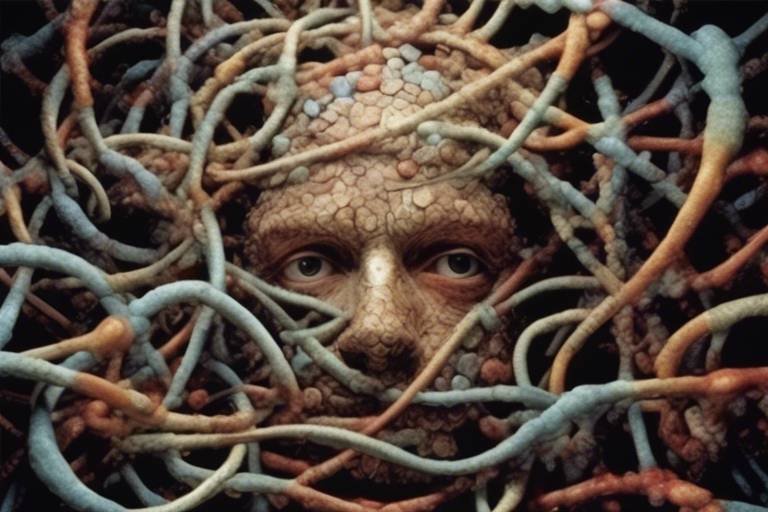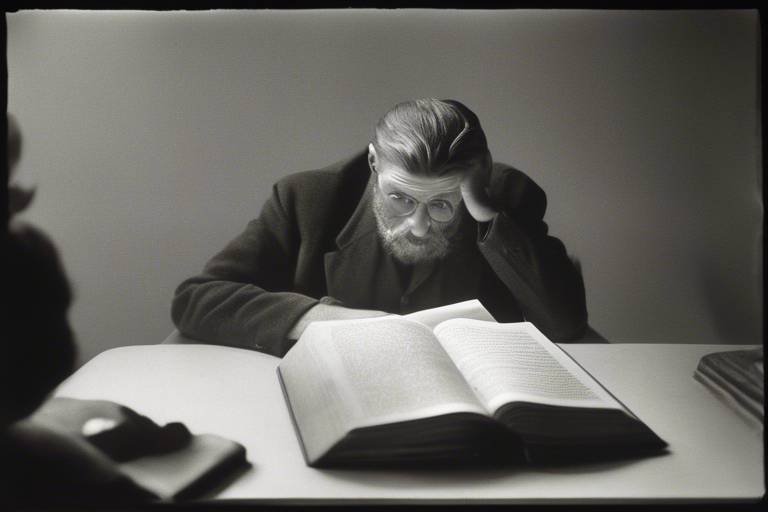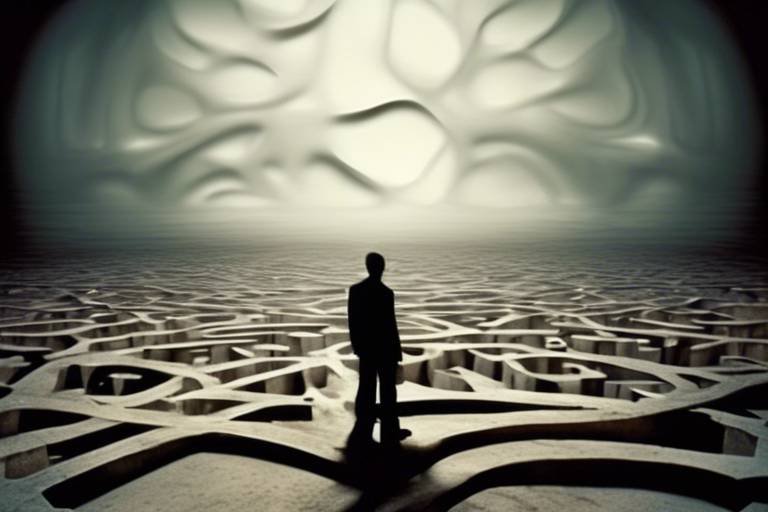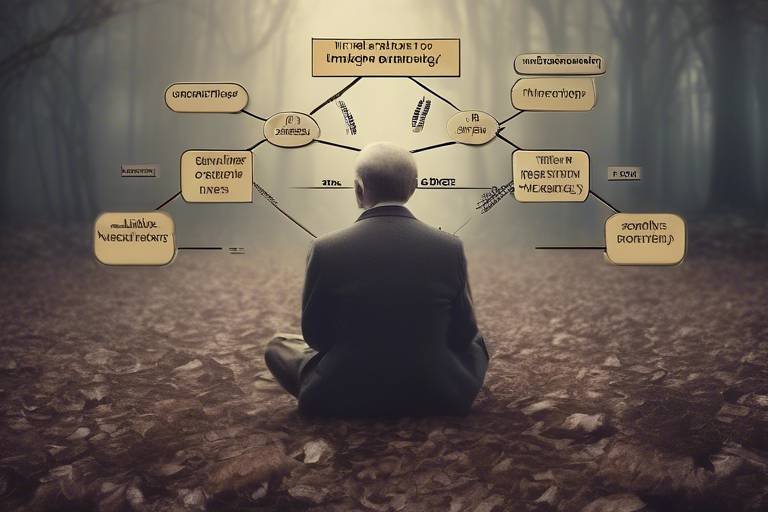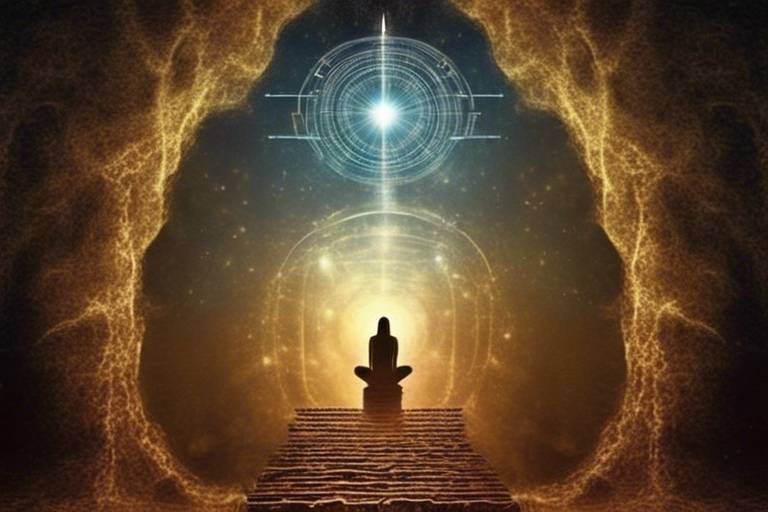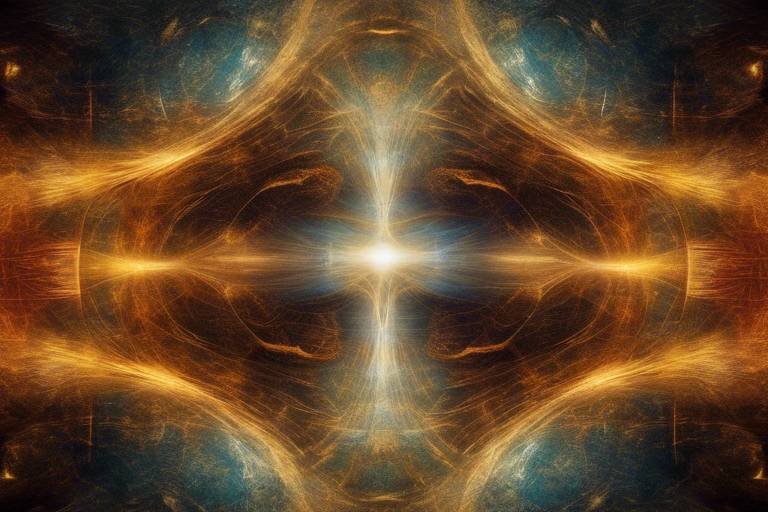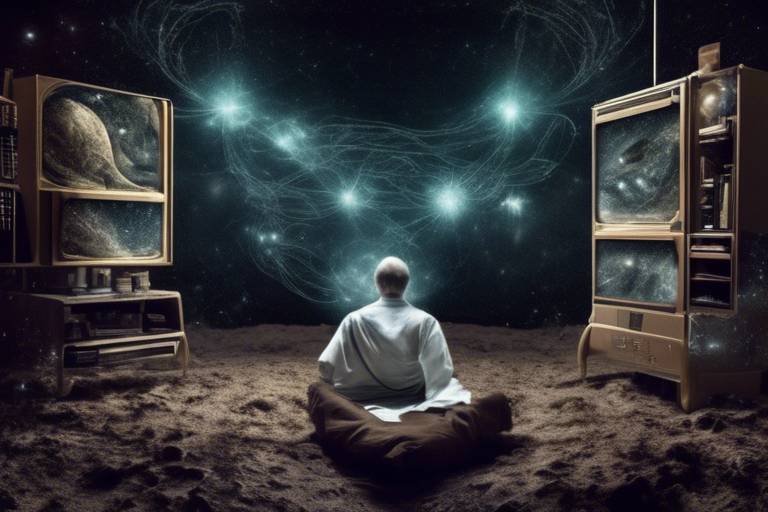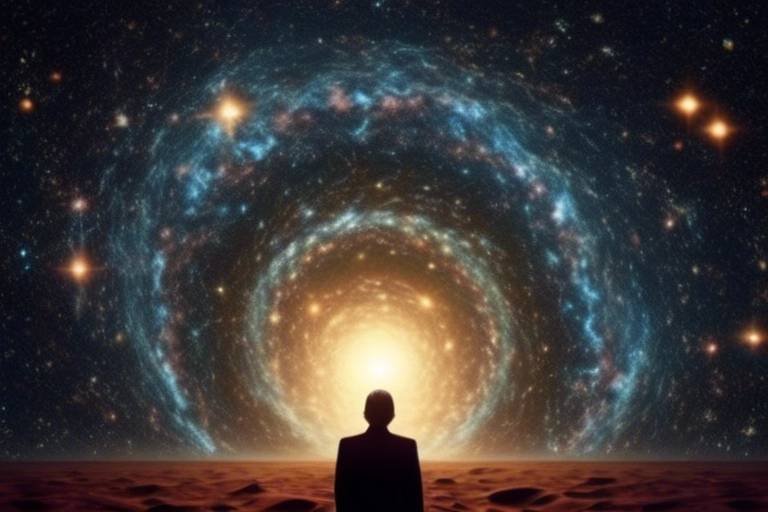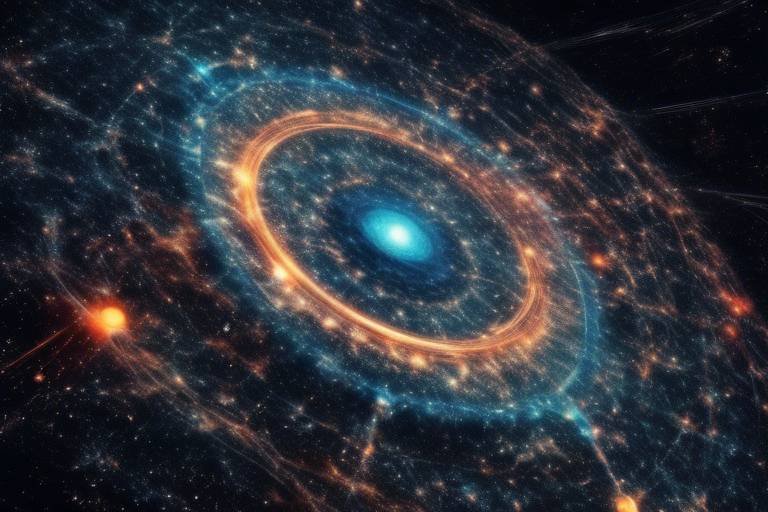The Role of Ontology in Unraveling Human Existence
Have you ever paused to ponder the **nature of your existence**? What does it truly mean to "be"? These questions might seem abstract, yet they lie at the heart of ontology, a branch of philosophy that dives deep into the essence of being and existence. Ontology isn't just a dusty topic confined to the pages of philosophical texts; it’s a vibrant field that shapes our understanding of **human life and consciousness**. Think of ontology as the lens through which we can examine the very fabric of reality, helping us unravel the mysteries of our existence and our place in the universe.
In a world bustling with distractions and superficial concerns, ontology invites us to slow down and reflect. It challenges us to ask profound questions like: "What does it mean to be human?" and "How do our identities shape our experiences?" By exploring these questions, ontology doesn’t just provide answers; it enriches our lives by fostering a deeper connection to ourselves and the world around us. It encourages us to look beyond the surface and confront the fundamental aspects of our identity and existence.
As we embark on this exploration of ontology, we'll uncover its historical roots, its implications for human identity, and how it intersects with modern science. Through this journey, we aim to illuminate how ontology can enhance our understanding of life, consciousness, and what it means to be human. So, grab a cup of coffee, sit back, and let’s dive into the fascinating world of ontology!
Ontology, at its core, is the study of being and existence. But where did this intriguing field of philosophy originate? Its roots can be traced back to ancient thinkers like **Plato** and **Aristotle**, who laid the groundwork for philosophical inquiry into the nature of reality. Plato's theory of forms, for instance, proposed that beyond our physical world lies a realm of perfect, abstract forms that represent the true essence of things. Aristotle, on the other hand, focused on categorizing existence and understanding the principles that govern the material world.
Throughout history, ontology has evolved, incorporating various perspectives and ideas. In the **Middle Ages**, scholars like **Thomas Aquinas** merged ontology with theology, emphasizing the relationship between being and divine existence. Fast forward to the **20th century**, and we find existentialists like **Jean-Paul Sartre** and **Martin Heidegger** reshaping ontology to explore human existence, freedom, and the search for meaning. Their work prompts us to consider not just what it means to exist, but how we engage with that existence on a personal level.
In today’s fast-paced world, understanding ontology is more crucial than ever. It encourages us to reflect on our values, beliefs, and the very essence of our being. By engaging with ontological questions, we can gain insights into our identities, relationships, and the broader human experience.
When we think about ontology, one of the first areas that come to mind is **human identity**. What makes us who we are? Is it our memories, our thoughts, or perhaps our relationships? Ontology dives into these questions, exploring concepts like **selfhood** and **consciousness**. Selfhood, in particular, is a fascinating aspect of ontology that examines our understanding of ourselves as distinct individuals.
Selfhood is not just about recognizing our existence; it’s about understanding the intricate layers that comprise our identities. Different philosophical perspectives offer unique insights into selfhood. For instance, **René Descartes** famously stated, "I think, therefore I am," emphasizing the role of thought in establishing existence. In contrast, **David Hume** argued that the self is merely a collection of perceptions, challenging the notion of a consistent, unchanging identity.
These differing viewpoints on selfhood highlight the complexity of human identity. Here’s a brief overview of some key perspectives:
| Philosopher | Viewpoint |
|---|---|
| René Descartes | "I think, therefore I am" - Emphasizes thought as proof of existence. |
| David Hume | The self is a bundle of perceptions; there is no constant self. |
| Immanuel Kant | The self is a necessary condition for experience and knowledge. |
As we navigate through life, existential questions often arise, prompting us to seek meaning and purpose. Ontology helps frame these inquiries, guiding us to explore our motivations, desires, and the essence of our existence. It’s like standing at a crossroads, where each path represents a different aspect of our identity, and ontology provides the map to navigate these choices.
Consciousness is another vital element in the ontology discussion. It’s the lens through which we experience the world, shaping our perceptions and interactions. But how does consciousness relate to existence? This question has sparked extensive philosophical debates. Some argue that consciousness is fundamental to being, while others contend it’s merely a byproduct of physical processes in the brain.
The intersection of ontology and modern science opens up a treasure trove of intriguing questions. As advancements in fields like physics and neuroscience continue to unfold, they challenge traditional ontological perspectives. For instance, quantum physics suggests that reality may not be as concrete as we once believed, prompting us to reconsider our understanding of existence itself.
Scientific ontology examines the nature of reality through a scientific lens, merging empirical evidence with philosophical inquiry. This approach allows us to explore how scientific findings inform our understanding of existence, from the quantum realm to the vastness of the cosmos. It’s a fascinating dance between science and philosophy, where each discipline enriches the other.
The implications of scientific ontology for human existence are profound. As we learn more about the universe and our place within it, our perceptions of life, identity, and the human experience evolve. This ongoing dialogue between ontology and science invites us to reconsider our beliefs and assumptions, ultimately leading to a deeper understanding of what it means to be human.
- What is ontology? Ontology is the philosophical study of being and existence, exploring the nature of reality.
- How does ontology relate to human identity? Ontology helps us understand the essence of selfhood, consciousness, and what it means to be human.
- Why is ontology important in modern science? It provides a framework for examining how scientific discoveries influence our understanding of existence.

Understanding Ontology
Ontology, a term that might sound a bit intimidating at first, is fundamentally about the study of being and existence. It’s like peeling back the layers of an onion to uncover what really lies at the core of reality. This branch of philosophy has roots that stretch back to ancient thinkers such as Aristotle, who pondered the nature of existence and what it means to be. But what does it really mean for us today? Well, ontology challenges us to consider not just what exists, but the very nature of existence itself. It invites us to ask profound questions: What does it mean to exist? Are there different modes of being? And how do these concepts shape our understanding of human life?
Historically, ontology has played a pivotal role in shaping philosophical discourse. It serves as the foundation upon which many other philosophical inquiries are built. Think of it as the bedrock of our understanding of reality, influencing everything from metaphysics to epistemology. The significance of ontology lies in its ability to provide a framework through which we can analyze and interpret the world around us. It’s not just an abstract concept; it’s a practical tool that allows us to navigate the complexities of existence.
In contemporary discussions, ontology often intersects with various fields, including science, psychology, and even artificial intelligence. As we delve deeper into the essence of what it means to be human, we find that ontology provides vital insights. For instance, when we explore the nature of consciousness, we are also engaging in ontological questions about the self and existence. This interplay between ontology and other disciplines enriches our understanding and pushes the boundaries of human thought.
To further grasp the importance of ontology, consider the following key aspects:
- Historical Significance: Ontology has influenced countless thinkers and movements throughout history.
- Framework for Understanding: It provides a lens through which we can analyze existence and reality.
- Interdisciplinary Connections: Ontology has implications in various fields, expanding its relevance in modern discussions.
As we embark on this journey of exploration, keep in mind that ontology is not just an academic pursuit; it’s a deeply personal inquiry that resonates with our everyday lives. By understanding ontology, we unlock the potential to engage with profound questions about our identity, our consciousness, and ultimately, our place in the universe. So, are you ready to dive deeper into the essence of being? Let’s continue this exploration together!

Ontology and Human Identity
When we dive into the realm of ontology, we inevitably stumble upon the intricate tapestry of human identity. This exploration is not just a philosophical exercise; it’s a deeply personal journey that resonates with each of us. Have you ever paused to consider what truly defines you? Is it your memories, your thoughts, or perhaps the relationships you nurture? Ontology offers us tools to dissect these questions, helping us peel back the layers of selfhood and existence.
At the heart of ontology lies the concept of selfhood, which serves as a cornerstone for understanding human identity. Selfhood is not merely about existing; it’s about recognizing one’s own existence in relation to the world. Various philosophical perspectives have emerged over centuries, each offering unique insights into what it means to be a self. For instance, existentialists argue that we create our own essence through our choices, while essentialists believe that our identity is defined by inherent traits. This divergence in thought leads us to ponder: Are we the sum of our experiences, or are we born with a predetermined essence?
Exploring selfhood is akin to embarking on a treasure hunt through the mind. Each philosophical perspective acts as a clue, guiding us toward a deeper understanding of our existence. Consider the views of renowned philosophers:
| Philosopher | Perspective on Selfhood |
|---|---|
| René Descartes | "I think, therefore I am" – emphasizing thought as the essence of self. |
| Søren Kierkegaard | Focus on individual choice and responsibility in defining selfhood. |
| Friedrich Nietzsche | The concept of the "Übermensch" or "Overman," advocating for self-creation and personal power. |
Each of these thinkers provides a unique lens through which we can examine our identities. By understanding these perspectives, we can better appreciate the complexities of our selfhood. But what does this mean in the context of our everyday lives? It suggests that our identity is not static; it's a dynamic interplay of thoughts, experiences, and choices.
As we navigate the landscape of ontology and selfhood, we inevitably encounter existential questions. These inquiries arise from our innate desire for meaning and understanding. Questions such as:
- What is the purpose of my existence?
- How do my relationships shape who I am?
- What happens to my identity after death?
These questions don’t just linger in the back of our minds; they demand answers and push us to reflect on our lives. Ontology provides a framework to explore these existential dilemmas, offering insights into the human condition. It encourages us to confront the uncertainties of life and embrace the journey of self-discovery.
Furthermore, the relationship between consciousness and being cannot be overlooked. Consciousness is the lens through which we perceive our existence, influencing how we interpret our experiences and understand our identity. Philosophers have debated whether consciousness is a byproduct of our physical being or if it constitutes a separate essence altogether. This ongoing dialogue opens up further avenues for exploration, inviting us to ponder the nature of our thoughts and feelings. Are they mere reflections of our physical selves, or do they point to something deeper?
In conclusion, ontology and human identity are intricately intertwined. By studying the nature of being, we gain valuable insights into who we are and the essence of our existence. As we continue to explore these profound concepts, we not only enrich our understanding of ourselves but also connect with the shared human experience.
- What is ontology? Ontology is the branch of philosophy that studies the nature of being, existence, and reality.
- How does ontology relate to human identity? Ontology helps us understand the concepts of selfhood, consciousness, and the essence of being human.
- Why are existential questions important? They drive our search for meaning and help us reflect on our lives and identities.
- Can ontology influence modern science? Yes, scientific advancements often lead to new ontological perspectives on human existence.

Selfhood and Existence
When we dive into the depths of selfhood, we uncover layers of complexity that shape our very existence. Selfhood is not just about recognizing oneself in the mirror; it’s a profound journey into understanding who we are at our core. Think of it as peeling an onion—each layer represents different facets of our identity, experiences, and consciousness. But what does it truly mean to exist as a self? This question has puzzled philosophers for centuries, and it’s crucial for us to explore the various perspectives that have emerged over time.
At the heart of this exploration lies the concept of existentialism, which posits that existence precedes essence. In simpler terms, this means that we are not born with a predetermined purpose; instead, we create our own meaning through our actions and choices. This notion challenges the traditional views that suggest our identities are fixed or divinely ordained. Instead, existentialism embraces the idea that we are free to define ourselves, a notion that can be both liberating and daunting.
Different philosophers have contributed to our understanding of selfhood in unique ways. For instance, René Descartes famously declared, “I think, therefore I am,” emphasizing that the act of thinking is a clear indicator of existence. In contrast, David Hume argued that the self is merely a bundle of perceptions, suggesting that there is no singular, unchanging self. This debate raises essential questions: Are we more than just the sum of our experiences? Is there a constant self that persists through time, or are we constantly evolving?
As we ponder these philosophical perspectives, we also encounter existential questions that arise from our quest for meaning. Some of these questions include:
- What is the purpose of my life?
- How do my choices define who I am?
- Is selfhood an illusion, or is there a core identity that remains constant?
These inquiries can lead to profound insights about our existence. For instance, the struggle to find meaning in a seemingly chaotic world can prompt us to reflect on our values and beliefs, ultimately shaping our identities. It’s a journey that requires introspection and courage, as it often forces us to confront uncomfortable truths about ourselves and our place in the universe.
Moreover, the relationship between selfhood and existence is intricately tied to our consciousness. Our ability to reflect on our thoughts, feelings, and experiences allows us to construct a narrative of who we are. This self-reflective capability is what differentiates humans from other beings. It’s like being the author of your own story, with the power to edit and revise as you navigate through life. However, this creative process can also lead to existential angst when we grapple with questions about authenticity and the fear of not living up to our potential.
In summary, the exploration of selfhood within the context of existence is a rich and multifaceted endeavor. It invites us to question our assumptions, challenge our beliefs, and ultimately embrace the complexity of our identities. As we continue to unravel the threads of selfhood, we discover that our existence is not merely a state of being; it is an ongoing process of becoming, shaped by our choices, experiences, and reflections. So, what does it mean to be you? That’s a question only you can answer, and the journey to find that answer is what makes life truly fascinating.
- What is selfhood? Selfhood refers to the qualities that make one a distinct individual, including consciousness, identity, and the capacity for self-reflection.
- How does philosophy define existence? Philosophy often defines existence in terms of being, reality, and the nature of the self, exploring questions about what it means to be alive and aware.
- Can selfhood change over time? Yes, selfhood can evolve based on experiences, relationships, and personal growth, reflecting the dynamic nature of human identity.

Philosophical Perspectives
When we dive into the realm of ontology, we encounter a rich tapestry of philosophical perspectives that have shaped our understanding of selfhood and existence. Think of these perspectives as different lenses through which we can examine the intricate nature of what it means to be human. Each philosopher brings a unique flavor to the table, often challenging the status quo and inviting us to reconsider our assumptions about identity and being.
For instance, let's take René Descartes, a towering figure in Western philosophy. His famous dictum, "Cogito, ergo sum" or "I think, therefore I am," underscores the importance of consciousness in defining existence. Descartes posited that the very act of thinking is proof of one's existence, suggesting that our self-awareness is central to our identity. This perspective invites us to ponder: if we were to lose our ability to think, would we still be ourselves? Descartes' approach emphasizes a dualistic view, where the mind and body are distinct entities, leading to rich discussions about the nature of consciousness.
On the other hand, we have David Hume, who took a more skeptical stance. Hume questioned the notion of a permanent self, arguing that what we consider 'self' is merely a bundle of perceptions and experiences. According to him, there is no underlying essence that defines us; instead, we are ever-changing, shaped by our interactions with the world. This perspective can be both liberating and unsettling. It encourages us to embrace the fluidity of identity but also raises existential questions about the continuity of self over time.
Then there's Friedrich Nietzsche, who famously declared the "death of God" and challenged traditional notions of morality and identity. Nietzsche's concept of the "Übermensch," or "Overman," suggests that individuals must transcend societal norms to create their own values and identities. He posited that selfhood is not given but made, urging us to embrace our unique paths and forge our destinies. This perspective resonates with many today, particularly in a world that often pressures conformity.
In contrast, Martin Heidegger introduced a more existential approach to ontology. He emphasized the concept of "Being" as a fundamental aspect of human existence. Heidegger argued that we must confront our own mortality to truly understand what it means to be. His exploration of "Dasein," or "being-there," invites us to consider our place in the world and our relationship with time. This perspective encourages a deep reflection on living authentically and being present in the moment.
Ultimately, these philosophical perspectives offer a rich dialogue about selfhood and existence. They challenge us to think critically about our identities and the essence of being human. The beauty of ontology lies in its capacity to evoke questions rather than provide definitive answers. As we navigate our lives, these philosophical insights serve as guiding stars, illuminating the complexities of our existence.
- What is ontology? Ontology is the philosophical study of being and existence, exploring the nature of reality and what it means to exist.
- How does ontology relate to human identity? Ontology helps us understand the essence of selfhood, consciousness, and the fundamental nature of what it means to be human.
- Who are some key philosophers in ontology? Notable philosophers include René Descartes, David Hume, Friedrich Nietzsche, and Martin Heidegger, each offering unique insights into selfhood and existence.
- Why is understanding ontology important? Understanding ontology allows us to explore profound existential questions, shaping our perceptions of life, identity, and our place in the universe.

Existential Questions
When we dive into the depths of ontology, we can't help but stumble upon some of the most profound that have puzzled humanity for centuries. What does it mean to truly exist? Are we merely biological machines, or is there something more to our being? These questions aren't just academic—they resonate with our daily lives and shape our understanding of ourselves and the world around us.
At the core of these inquiries lies the desire to find meaning. Many of us grapple with the uncertainty of our purpose, and ontology provides a framework to explore these thoughts. For instance, when we ponder, "Why am I here?" or "What is my role in the universe?" we are engaging in a dialogue with our own existence. These questions can be daunting, yet they also offer a unique opportunity for introspection and growth.
Consider this: our existence is like a vast ocean, with each question representing a wave that can either crash upon us or propel us forward. Some waves may feel overwhelming, while others can guide us toward deeper understanding. Ontology helps us navigate these waters by framing our thoughts and emotions, allowing us to explore the essence of our being.
Furthermore, existential questions often lead us to confront our mortality. The awareness of our finite existence can be both liberating and terrifying. It prompts us to ask, "What legacy will I leave behind?" and "How do I want to be remembered?" These reflections can ignite a passion for living fully, encouraging us to embrace each moment and find joy in the present.
Incorporating insights from various philosophical traditions, we can categorize some common existential questions that arise in our quest for understanding:
- What is the nature of reality? - This question probes the very fabric of existence, challenging us to distinguish between perception and reality.
- Is there a higher purpose? - Many wonder if our lives are part of a greater plan or if we are simply drifting through a chaotic universe.
- What defines consciousness? - This inquiry leads us to explore the relationship between our thoughts, feelings, and the essence of being alive.
- How do we find meaning in suffering? - The presence of pain and hardship raises questions about the nature of existence and our capacity for resilience.
As we grapple with these existential questions, ontology serves as a guiding light, illuminating the paths we might take in our search for understanding. It encourages us to embrace uncertainty while fostering a sense of curiosity about our existence. Ultimately, by confronting these questions, we not only deepen our understanding of ourselves but also enrich our connections with others, as we share in the universal quest for meaning.
- What is ontology? - Ontology is the philosophical study of being, existence, and the nature of reality.
- How does ontology relate to human identity? - Ontology helps us explore concepts like selfhood and consciousness, which are crucial to understanding what it means to be human.
- Why are existential questions important? - These questions encourage self-reflection and can lead to a deeper understanding of our purpose and place in the universe.
- Can ontology influence modern science? - Yes, scientific ontology examines reality through a scientific lens, impacting our views on existence and human life.

Consciousness and Being
When we dive into the intricate relationship between consciousness and being, we find ourselves in a realm that is both fascinating and perplexing. Consciousness is not just a passive experience; it's an active engagement with the world around us, shaping our understanding of what it means to exist. Imagine consciousness as a vibrant tapestry, woven from threads of thoughts, emotions, and perceptions, each contributing to the rich fabric of our being.
Philosophers have long debated the essence of consciousness. Is it merely a byproduct of neurological processes, or does it hold a deeper significance? Some argue that consciousness is a fundamental aspect of existence itself, suggesting that to be conscious is to truly be alive. This perspective aligns with the idea that our awareness and experiences are what define our reality. Without consciousness, we might as well be like a computer—processing information without truly experiencing life.
Moreover, the interplay between consciousness and being raises profound existential questions. For instance, how does our awareness of our own existence influence our choices and actions? When we reflect on our lives, we often encounter moments of clarity that illuminate our path forward. These moments are not just fleeting; they are pivotal in shaping our identity and purpose. Think of consciousness as a lighthouse guiding us through the fog of uncertainty, helping us navigate the complexities of life.
To better understand this relationship, consider the following key points:
- Awareness of Self: Our ability to reflect on our thoughts and feelings allows us to develop a sense of self. This self-awareness is crucial in defining our existence.
- Impact on Reality: Consciousness influences how we perceive reality. Our interpretations of events are colored by our thoughts and feelings.
- Existential Reflection: Engaging with our consciousness prompts us to ask questions about our purpose and place in the universe.
In the realm of ontology, consciousness is often viewed as the bridge between the mind and the world. It allows us to experience being in a way that is uniquely human. This experience is not just about existing in a physical sense, but about engaging with the world emotionally and intellectually. When we consider the nature of being, we must acknowledge that consciousness plays a pivotal role in how we construct meaning in our lives.
Ultimately, the exploration of consciousness and being invites us to reflect on our own experiences. It challenges us to consider how our awareness shapes our reality and influences our existence. As we continue to unravel the mysteries of consciousness, we may find that understanding our own being is the key to unlocking the deeper questions of life.
- What is consciousness? Consciousness is the state of being aware of and able to think about one's own existence, thoughts, and surroundings.
- How does consciousness relate to being? Consciousness acts as a lens through which we experience and interpret our existence, shaping our understanding of reality.
- Can consciousness exist without a physical body? This is a debated topic in philosophy; some argue that consciousness is tied to the brain, while others believe it can exist independently.
- What role does self-awareness play in human identity? Self-awareness allows individuals to reflect on their thoughts and emotions, contributing significantly to their sense of identity and purpose.

Ontology in Modern Science
In today's rapidly evolving world, the intersection of ontology and modern science presents a fascinating landscape of inquiry. As we delve into the depths of existence, we find that scientific advancements not only challenge our traditional notions of being but also enrich our understanding of what it means to exist. The relationship between ontology and science is akin to a dance, where each step reveals new insights and raises further questions about the nature of reality.
One of the most compelling aspects of this relationship is how scientific discoveries force us to reconsider our ontological frameworks. For instance, the advent of quantum mechanics has upended classical notions of reality, suggesting that particles can exist in multiple states simultaneously until observed. This phenomenon prompts us to ask: What does it mean for something to exist? Is existence contingent upon observation, or does it persist independently of our awareness? Such questions echo the age-old philosophical debates but are now informed by empirical evidence.
Moreover, the exploration of consciousness through neuroscience has profound implications for ontology. As scientists investigate the neural correlates of consciousness, they uncover the intricate mechanisms that give rise to our subjective experiences. This scientific endeavor raises yet another existential question: Is consciousness merely a byproduct of biological processes, or does it point to something more profound about our existence? The implications of these inquiries extend beyond the laboratory, influencing our understanding of identity, selfhood, and the very fabric of reality.
To illustrate the impact of scientific ontology on our perception of existence, consider the following table that outlines some key scientific advancements and their ontological implications:
| Scientific Advancement | Ontological Implication |
|---|---|
| Quantum Mechanics | Challenges the notion of definite states of existence |
| Neuroscience | Explores the relationship between brain activity and consciousness |
| Artificial Intelligence | Questions the boundaries of consciousness and selfhood |
| Astrophysics | Expands our understanding of existence beyond Earth |
As we reflect on these advancements, it's clear that the implications for human existence are profound. We are not merely passive observers of the universe; rather, we are active participants in a complex web of existence that is constantly evolving. The insights gained from scientific ontology challenge us to rethink our place in the cosmos and our relationship with the world around us.
In conclusion, the dialogue between ontology and modern science is not just an academic exercise; it is a vital exploration that touches on the very essence of what it means to be human. As we navigate this intricate landscape, we find ourselves confronted with questions that are both exhilarating and daunting. Each scientific breakthrough invites us to delve deeper into the mysteries of existence, urging us to embrace the uncertainty and wonder that lie at the heart of our being.
- What is ontology? Ontology is the philosophical study of being, existence, and the nature of reality.
- How does modern science influence ontology? Scientific advancements challenge traditional ontological views and provide new insights into the nature of existence.
- What role does consciousness play in ontology? Consciousness is a central theme in ontology, raising questions about the relationship between the mind and existence.
- Can scientific findings change our understanding of selfhood? Yes, discoveries in neuroscience and AI prompt us to reconsider the nature of identity and selfhood.

Scientific Ontology
When we think about ontology, we often picture philosophers deep in thought, pondering the essence of existence. However, as we dive into the realm of , we discover a fascinating interplay between the abstract concepts of being and the concrete findings of modern science. Scientific ontology examines the nature of reality through a scientific lens, merging philosophical inquiry with empirical evidence. This intersection not only enriches our understanding of existence but also challenges our preconceived notions about what it means to be human.
At its core, scientific ontology seeks to answer questions like: What is the nature of reality? How do we define existence? And importantly, how do our scientific discoveries shape our understanding of ourselves? As scientists probe the mysteries of the universe—from the tiniest subatomic particles to the vastness of cosmic structures—they inadvertently contribute to the ontological discourse. For instance, the discovery of quantum mechanics has forced us to reconsider the very fabric of reality, suggesting that particles can exist in multiple states simultaneously. This challenges the traditional notion of being and prompts us to ask: If existence can be so fluid, what does that mean for our own identity?
Moreover, the advancements in neuroscience have opened new avenues in understanding consciousness, a key aspect of ontology. By studying the brain's functions and how they correlate with thoughts, feelings, and perceptions, scientists are providing insights into the nature of selfhood. This leads us to ponder: Are we merely the sum of our neural connections, or is there something more profound that constitutes our being? The implications of these findings are profound, as they suggest that our understanding of existence is not static but rather a dynamic interplay of science and philosophy.
To illustrate this relationship further, consider the following table that outlines some significant scientific advancements and their ontological implications:
| Scientific Advancement | Ontological Implication |
|---|---|
| Quantum Mechanics | Challenges traditional notions of reality and existence. |
| Neuroscience | Explores the relationship between brain function and consciousness. |
| Genetics | Raises questions about identity and the essence of being human. |
| Artificial Intelligence | Provokes discussions about consciousness and what it means to be alive. |
As we continue to explore these intersections, it's essential to recognize that scientific ontology does not provide all the answers; rather, it enriches the questions we ask about existence. It invites us to engage in a dialogue between science and philosophy, where each discipline informs and challenges the other. In this way, scientific ontology becomes a powerful tool in our quest to understand not just the universe around us, but also our place within it.
In conclusion, the relationship between science and ontology is a vibrant and evolving field of study. As we push the boundaries of knowledge, we must remain open to the profound implications these discoveries have on our understanding of existence. So, the next time you ponder the nature of being, remember that science and philosophy are not opposing forces; they are two sides of the same coin, each illuminating the mysteries of human existence in their unique way.
- What is scientific ontology? Scientific ontology is the study of the nature of reality through scientific methods, examining how scientific discoveries influence our understanding of existence.
- How does quantum mechanics relate to ontology? Quantum mechanics challenges traditional views of reality, suggesting that existence can be fluid and multi-faceted.
- What role does neuroscience play in understanding consciousness? Neuroscience explores the brain's functions and their connection to consciousness, prompting questions about the essence of selfhood.
- Can science and philosophy coexist in understanding existence? Yes, science and philosophy can complement each other, enriching our understanding of existence through a dialogue between empirical evidence and philosophical inquiry.

Implications for Human Existence
When we dive into the world of ontology, particularly through the lens of modern science, we find ourselves faced with profound implications for our understanding of human existence. It's almost like peeling back the layers of an onion—each layer reveals something new and sometimes unexpected about who we are and our place in the cosmos. As scientific advancements continue to unravel the mysteries of life, we are compelled to reconsider age-old questions about our identity, consciousness, and even the essence of what it means to be human.
One of the most significant implications is how scientific ontology reshapes our perception of reality. For instance, the discovery of quantum mechanics has introduced a level of complexity to our understanding of existence that was previously unimaginable. It challenges the traditional notions of a fixed, objective reality and suggests that our consciousness plays a role in shaping what we perceive. This leads us to ask: Are we merely observers in a vast universe, or do we have an active role in creating our own realities?
Moreover, as we explore the intersection of ontology and science, we begin to see a shift in how we define human existence. The advancements in fields like neuroscience and artificial intelligence have prompted us to question the uniqueness of human consciousness. Is our ability to think and feel truly exclusive to us, or can machines also possess a form of consciousness? This inquiry not only impacts our understanding of ourselves but also raises ethical questions about the treatment of sentient beings, whether biological or artificial.
Additionally, the implications of scientific ontology extend to our understanding of life and death. With breakthroughs in biotechnology and genetic engineering, we are now able to manipulate the very building blocks of life. This capability brings forth existential dilemmas: What does it mean to be alive? Can we alter our essence, or is there an inherent quality that defines our humanity? As we grapple with these questions, we find ourselves at a crossroads, where the lines between human and machine, life and artificial life, are increasingly blurred.
In essence, the implications for human existence arising from the fusion of ontology and modern science compel us to rethink our beliefs and assumptions. We are invited to explore new paradigms that challenge our traditional views of selfhood and existence. This journey into the unknown is not just an academic exercise; it profoundly affects our everyday lives. As we navigate this evolving landscape, we must remain open to the possibility that our understanding of what it means to be human is not static but rather a dynamic tapestry woven from the threads of science, philosophy, and consciousness.
- What is ontology? Ontology is the philosophical study of the nature of being, existence, and reality. It explores concepts related to what it means to exist and the categories of being.
- How does ontology relate to human identity? Ontology helps us understand human identity by examining concepts like selfhood and consciousness, which are essential to our understanding of what it means to be human.
- What are the implications of scientific ontology? Scientific ontology challenges traditional views of existence and consciousness, prompting us to reconsider our understanding of life, identity, and our role in the universe.
- Can machines possess consciousness? This is a debated topic; advancements in AI raise questions about the nature of consciousness and whether it can be replicated in non-biological entities.
- What ethical considerations arise from advancements in biotechnology? As we gain the ability to manipulate life, we face ethical dilemmas regarding the definition of life, the treatment of sentient beings, and the implications of genetic engineering.
Frequently Asked Questions
- What is ontology?
Ontology is a branch of philosophy that studies the nature of being, existence, and reality. It seeks to understand what entities exist and how they can be categorized and related within a framework of understanding.
- How does ontology relate to human identity?
Ontology plays a significant role in shaping our understanding of human identity by exploring concepts like selfhood and consciousness. It helps us delve into what it means to be human and how we perceive ourselves in relation to the world.
- What are existential questions?
Existential questions are profound inquiries that arise from our quest for meaning and purpose in life. These questions often touch on our existence, identity, and the nature of reality, prompting us to reflect deeply on our place in the universe.
- How does consciousness fit into ontology?
Consciousness is a fundamental aspect of ontology, as it relates to our awareness of existence. Philosophical debates surrounding consciousness explore how it influences our understanding of being and existence, making it a key topic in ontological discussions.
- What is scientific ontology?
Scientific ontology examines the nature of reality through the lens of scientific inquiry. It investigates how scientific findings and theories shape our understanding of existence and the fundamental nature of the universe.
- What are the implications of scientific ontology for human existence?
The implications of scientific ontology for human existence are profound, as they can alter our perceptions of life, our role in the universe, and even our understanding of consciousness and identity. These insights challenge traditional views and encourage us to rethink our place in the cosmos.

